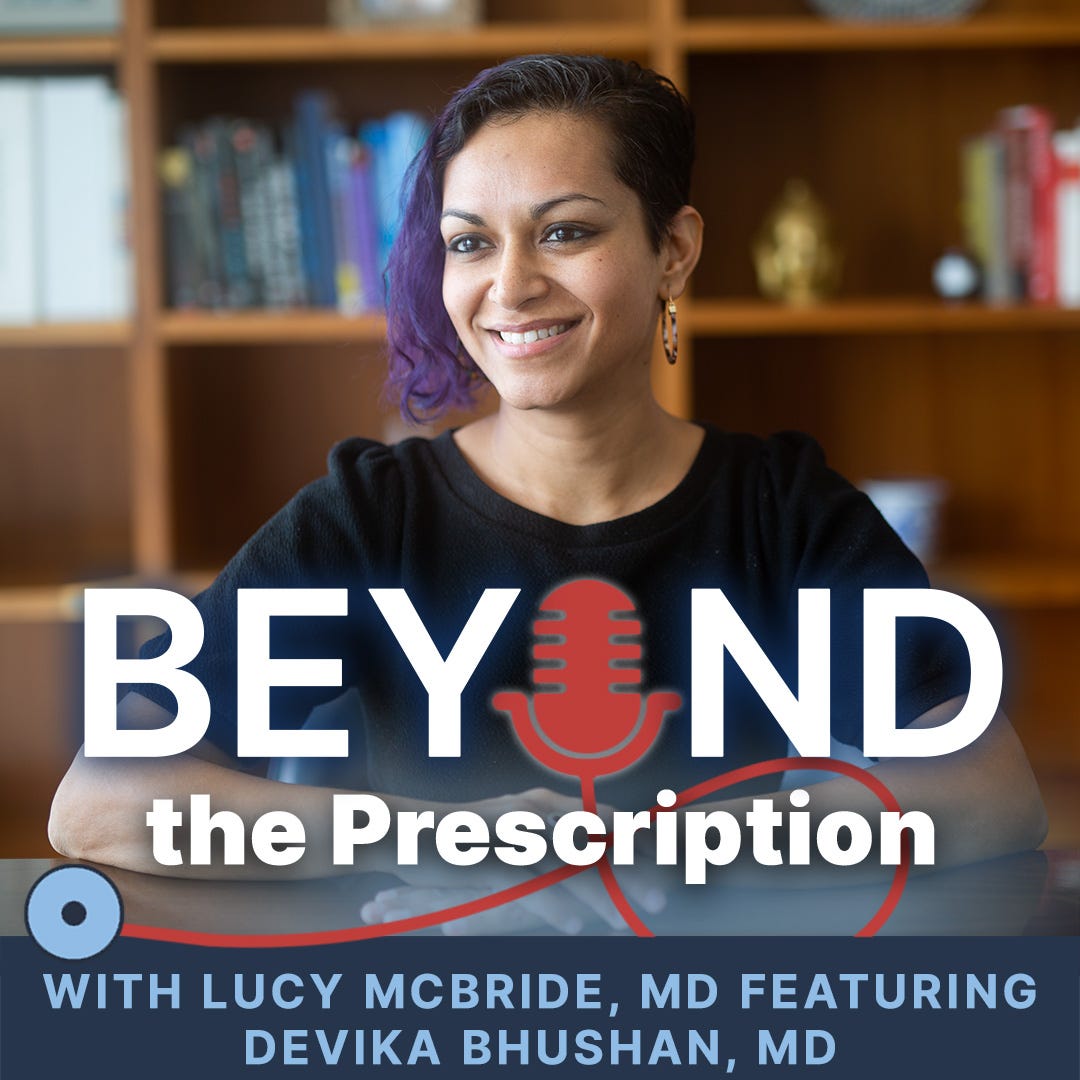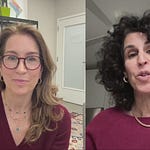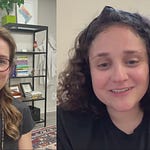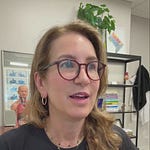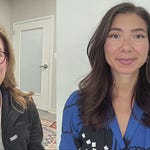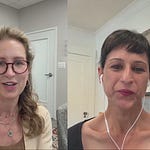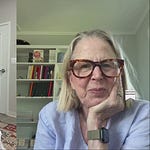You can also listen to this episode on Spotify!
While serving as California’s Acting Surgeon General last year, Dr. Bhushan publicly revealed her diagnosis in an effort to reduce stigma and spread hope for people suffering with mental illness:
I believe that our struggles can be the source of our superpowers. They can show us our capacity for vulnerability and strength, and that we can endure and overcome hard things.
Through her popular newsletter, Ask Dr Devika B, she is growing a community to help break down the stigma associated with mental illness. As she says, "Stigma festers in the dark and scatters in the light.”
On this episode of Beyond the Prescription, Dr. Bhushan shares her advice for mental wellbeing. The two doctors also discuss the complex roots of emotional distress; the shame around mental health diagnoses; and the possibility of post-traumatic growth.
Join Dr. McBride every other Monday for a new episode of Beyond the Prescription.
You can subscribe on Apple Podcasts, Spotify, or on her Substack at https://lucymcbride.substack.com/podcast. You can sign up for her free weekly newsletter at lucymcbride.substack.com/welcome.
Please be sure to like, rate, and review the show!
The transcript of the show is here!
[00:00:00] Dr. Lucy McBride: Hello, and welcome to my office. I'm Dr. Lucy McBride, and this is Beyond the Prescription, the show where I talk with my guests like I do my patients, pulling the curtain back on what it means to be healthy, redefining health as more than the absence of disease. As a primary care doctor, I've realized that patients are more than their cholesterol and their weight. We are the integrated sum of complex parts. I'm here to help people tell their story and for you to imagine and potentially get healthier from the inside out. You can subscribe to my free weekly newsletter at lucymcbride.substack.com and to the show on Apple Podcasts, Spotify, or wherever you get your podcasts. So let's get into it and go beyond the prescription.
[00:01:02] Today I'm joined by the amazing Dr. Devika Bhushan. Devika is a pediatrician and public health leader who has lived with bipolar disorder for the last 13 years. Devika served as California's acting Surgeon General in 2022, where she focused on initiatives around equity, resilience, and innovation. She's a firm believer that our trials and tribulations can help us flourish, and she's learned this through her own experience living with mental illness. Today we will talk about what it's like to face a mental health diagnosis and the individually oriented lessons she's learned along the way. Devika, thank you so much for joining me today.
[00:01:42] Dr. Devika Bhushan: It's so great to be here with you, Lucy. Thanks for having me.
[00:01:46] LM: So in your op ed for the LA Times last year, you wrote some pretty powerful words. You said, I believe that our struggles can be the source of our superpowers. They can show us our capacity for vulnerability and strength, and that we can endure and overcome hard things. Can you expand on that a little bit? What do you mean by our struggles being our superpowers?
[00:02:11] DB: So my toddler, his name is Rumi. And so it's very apt. I'm going to borrow a quote from Rumi. The wound is the place where the light enters us, and this also hearkens on this Japanese tradition whereby when a ceramic bowl breaks rather than throwing it away, they will actually patch it back together with gold.
[00:02:37] And so at the end of that break, what you're left with is a stronger bowl, a more unique bowl, and a more beautiful bowl. And I firmly believe that when you have a chance to walk through a really difficult time in your life, whether that's because of mental illness, whether it's physical health, whether it is an early experience of adversity, whatever it might be, I firmly believe that once you have emerged through that, and walked through it and come out the other side, you become much more self aware, number one. You know exactly where you're able to stretch and flex and accommodate and where you're going to break. Right. And so that knowledge when you acquire it is something that will never leave you and will always make you a better whatever you decide to do after that.
[00:03:29] So, for instance, like for me, I know that. I can endure a lot. But one thing that my brain, and anybody with bipolar disorder's brain, might not be able to tolerate is actually a lot of circadian rhythm shifts. So, for instance, when I was in residency training, I didn't really internalize this. The fact that I should, from the get go, be really careful about day night switches, about 28 hour calls.
[00:03:53] And I learned the hard way that those experiences led me to have mood episodes that required me to be out for three months, two months and really struggle to find an equilibrium again. And so that's number one, right? Like you learn exactly what you're capable of and what you cannot do, where your boundaries need to be as a person.
[00:04:13] Number two, I think you learn that there are superpowers that come from enduring really difficult things. So for me, one of those is that I'm a really deep empath and I really understand other people's struggles and vulnerabilities in a way that I don't think I would have if I hadn't had such deep and dark experiences of my own.
[00:04:36] And so when, you know, when I was a practicing pediatrician sitting with patients, sitting with families, walking through very challenging things, I could connect with how they were feeling and sometimes give them lessons from my own experiences when those were relevant in a way that really helped me be a better pediatrician. And I similarly found that when team members of mine, when I was the leader of a team, when folks would go through stuff in their own personal lives that was difficult, and impacted their work because we're all human beings first, and whatever's happening for us at home or outside of the work context does show up for us at work, I was able to connect again with what they were going through and help them make the space for whatever that was in a way that maybe a leader who hadn't had their own struggles wouldn't have been able to do. So I think on both of those levels, people don't always, acknowledge or talk about the ways in which struggles lead to superpowers.
[00:05:39] But that's a firm sort of belief of mine. And when I'm, for instance, interviewing podcast guests of my own on my podcast called spread the light with Dr. David Gabby, also published in my substack. One of the questions I always ask people is, “So how do you feel like this experience led to your unique strengths or superpowers?”
[00:06:00] And people always love reframing their experiences and distilling those strengths down for people. And I'll tell you, when I published my LA Times op ed, which you quoted from, that was the line that people most resonated with. And that was a line where people specifically said to me sometimes, “You know what? I never thought about my chronic PTSD or my... OCD or my borderline personality disorder as giving rise to these superpowers that I have. But you are so right. That's exactly how I experienced this. So I think it's a very empowering frame and it's an important one,
[00:06:35] LM: I think you're right. And I think mental health is having this moment, rightly so in the popular vocabulary, right? We've been talking about the mental health toll of the pandemic. We've been talking about the, the grief, the loss, the trauma people have experienced. And I think it's fantastic that we're finally identifying mental health as part of whole health.
[00:06:59] I think sometimes though people are confused about what mental health means or what it is. And I think sometimes we think that mental health means that you're happy or mental health means that you're content, mental health means you're not anxious And so I'm very clear with my patients and with my own kids and hopefully with myself as well, that mental health is really about that laddering up from self awareness that you described to acceptance of the things We can't control like we cannot control, for example, genetic predisposition towards bipolar disorder or breast cancer or what have you, and then leaning into the agency that we have and so mental health to me is really about self awareness.
[00:07:45] It's about sort of an understanding of where we can flex, where we have that extra Reserve and then where we need to hold a boundary. And so I think it's important to recognize what health, what mental health is. It's about having the resilience, the self awareness to weather the storms that inevitably come our way.
[00:08:06] It's not about being happy all the time. Happiness is great. We're not against happiness. We're all for happiness. I'm believer in contentedness, but I think it's those tools and that we have to get sometimes the hard way that are the most kind of beautiful and that the things we don't often count in our kind of resume of life skills.
[00:08:25] And I also want to say that Rumi is an old soul. Clearly he understands that even at two years old, when we break is when we repair as well… can shed some wisdom on our resilience. So let's talk about kids for a minute. So in your role as the acting Surgeon General in California, you did quite a lot of work on adverse childhood experiences or ACEs.
[00:08:49] And many people who are listening understand that there's an abundant amount of literature about the effect of adverse childhood experiences or ACEs on social, emotional, mental, and physical health issues later in life. So some of those are my patients, people who have had some sort of childhood experience of neglect, abuse, trauma, that shows up in their bodies in the form of hypertension, an anxiety disorder, binge eating. Our stories live in our bodies. And I commonly try to help patients with various physical problems by looking back at what happened, what's behind the curtain that we can then kind of connect to their current physical state. And it's often the case that a patient who's struggling with binge eating disorder and diabetes gets better when we put them on metformin and we get them in trauma therapy to work on kind of pulling the curtain back on what happened.
[00:09:48] And helping them understand that hypervigilance that was organized around a traumatic childhood experience shows up later in life. And that's, I mean, that's the most kind of fun part of my job, if you will. So adverse childhood experiences show up as social, emotional, mental, and physical health problems in patients later in life. And so I'd love to hear about your work on adverse childhood experiences and do you agree with me that they show up in our bodies, that our stories live in our bodies?
[00:10:18] DB: That is such a beautiful way to put that. And I could not agree more. Our experiences, whether positive or negative, end up living in our bodies, and they end up living in our bodies at a cellular level, at a organismal or organ level, um, systems level, and even for all, for the whole body, right, the whole system.
[00:10:39] And what we recognized around ACEs, so all of the folks listening, are probably well acquainted with this term, but these are essentially 10 experiences that are really difficult before you turn 18 years. So child abuse, neglect, growing up in a household where maybe somebody had an untreated mental illness, intimate partner violence between adults in the home, things of this nature.
[00:11:02] And basically what happens is that you're exposed over and over again to a threat and a stressor that is extreme. And so your threat response system and your stress response systems end up being activated and have trouble getting regulated and have trouble turning back off. And what happens is that can change the way that your brain develops, your hormonal cascades, your immune system, even your genes and the parts of your genes that regulate cellular aging.
[00:11:34] So those are called telomeres for those who are aware of this term and familiar with it. And so, you know, when you look at a population level, there is this dose response relationship between the number of ACEs you've had and all sorts of health outcomes, anything from cancer to heart disease to, of course, mental and behavioral health disorders.
[00:11:53] There's about 60 or more health conditions that you're at risk for. But equally, we know that being really intentional about turning off the stress response and using that, just as you mentioned, as part of the treatment plan for a patient who's coming in with a history of trauma and let's say diabetes or heart disease. If you are not intentionally looking at that toxic stress response that's in the background that has been with them potentially for years since their childhood and you're not specifically intervening on that toxic stress response, then you're leaving part of the physiology on the table.
[00:12:32] So the ACEs Aware initiative, which we launched at the end of 2019, just before some of the biggest traumatic events of our lives were to unfold during the pandemic, the plan there was to really help health care workers of all kinds understand toxic stress physiology. And so, you know, there's a lot of talk about ACE screening, whether, you know, universal ACE screening is worth it on an individual level.
[00:12:59] We know all of this stuff is true at the population level, that ACEs will put you at risk for these health conditions, that sometimes the link gets lost. So the point of ACEs Aware Initiative is not, in fact, to say, do you have ACEs or do you not have ACEs? It is actually to say, hey, are you coming in with health conditions and symptoms today that are rooted in a toxic stress response? And if so, if you're at risk for a toxic stress response, how can we specifically cater your healthcare to be more individualized, and to not only give you the metformin for your diabetes, but also to help you understand that trauma therapy, as you mentioned, or anti inflammatory nutrition, or certain exercise habits, sleep habits, connection, etc., that there are these other evidence based behavioral strategies that we have in our toolkits as healthcare providers, as individuals that we can start to use to specifically turn off the toxic stress response as a way of treating somebody.
[00:14:02] And so that, that message of hope is, I think, really important because we often talk about ACEs as posing risk for health, but we don't spend equal time sometimes talking about the fact that we do have these evidence based tools for enacting resilience if you do have toxic stress. In other words, toxic stress is preventable. And once it's in place, it's very treatable. And so that was the overall mission that we were working on at the ACEs Aware Initiative.
[00:14:31] LM: I love it. And then on top of it, there is the opportunity to make meaning and to find out where you can flex and where you need boundaries based on the self awareness from the work you might need to do on your toxic stress. So, let's talk about your childhood. Do you look back, Devika, on your childhood and see threads of your bipolar illness that predated the actual diagnosis? And, you know, to the extent you want to share that, I mean, how do you make sense of things that may have happened to you, good and bad, and the evolution of your mental health story?
[00:15:10] DB: It's a really important question. As we know, most people who have mental health symptoms, it's most common to start to have the first symptoms when you are in your teenage years or in your early 20s. And for me, my very first symptoms happened when I was in medical school. I didn't have any kind of sign of mental health instability or any kind of mental health symptom when I was growing up. I did have a very unusual childhood in some ways. So I spent… my first 21 years about a third in three different countries. So the first one was India, which is where my family is from originally and where my majority of my family actually still lives.
[00:15:52] So we started there. I was seven when I left India, and then we came to the US for a few years where my parents were grad students here. Very stressful set of circumstances financially and otherwise. And then we went to the Philippines for my parents’ jobs, which were in health and development. And we didn't know anyone in the Philippines when we first arrived, and we were supposed to have spent three years just trying it on for size.
[00:16:18] And my parents ended up spending over 20 years there. So it was a big part of our lives and big part of their careers. And so, within each one of those countries, even there was a lot of moves. So by the time I was in fifth grade, I was 11, but I had been to seven schools in three countries. So there was a lot of changes and a lot of transitions and a lot of figuring out who I was culturally, you know, where I belonged.
[00:16:45] There were these kind of deep existential questions taking place, although I will say my four person family, so it's my sister and I and two parents are a very close knit unit, and so that unit kept us grounded and it made us feel like we were in home, wherever we were and you know, that, that made all the difference because I think I felt very grounded growing up despite the fact that things were changing on us so often.
[00:17:14] And I felt like a lot of folks who have multiple cultural influences, multiple languages. I grew up speaking Hindi, then had to learn English and. You know, uh, the whole, uh, getting made fun of for my accent in the U S and trying to get rid of that accent overnight, you know, all of those different pieces of like, am I Indian? Am I American? Do I have influences from the Philippines, but I'm not quite Filipino, even though I've spent so many years here, there's all of that stuff growing up, but I will say kind of back to your question, nothing that really would qualify as a mental health symptom, just sort of common experiences around moves and cultural identity that I think anyone would have with a similar set of circumstances.
[00:17:59] And it wasn't until I hit medical school, as I was saying, I was 23 and my first symptoms were of the depressive variety. And I didn't have a family history of bipolar disorder. I didn't have a personal history of either hypomania or mania. And so it looked for all the world, like garden variety, unipolar depression, right?
[00:18:19] And I was treated with antidepressants, which ended up over the course of three years, not working and making my brain worse, which is typical when a brain is on the bipolar spectrum. So often what'll happen is you'll induce sort of the little bit of activation that's not recognized. It's actually hypomania in retrospect, but might just look like anxiety on top of the depression, right?
[00:18:42] And that's essentially what happened to me. I had about three years where I was on the wrong meds. And I tried 20 different meds, you know, in that span of time. And luckily, you know, three years in, I was on three different activating meds and had a frank manic episode. And that really saved my life because it allowed people to understand that I was somebody who had a bipolar spectrum disorder rather than a unipolar depression with anxiety on top of it, which was the working hypothesis.
[00:19:12] And that led me to have the right condition diagnosed and also the right treatments then in place, which, which really, really truly saved my life.
[00:19:21] LM: I want to interrupt you to say, well, I don't want to interrupt you, but I would, I want to say thank you for sharing that because I think there are a lot of people, I don't know the number. I don't think we know the number of people who are suffering with bipolar disorder, who are called. Depression and anxiety, right?
[00:19:39] I mean, depression and anxiety are extremely common conditions. You know, certainly if people have enough depression, they can be anxious about it. If people have enough anxiety, they can get depressed. But I do think there is a subset of people who are inappropriately treated who actually are on that spectrum and they didn't have that manic moment or the doctor to understand that's what that was.
[00:20:02] And then they get further medicated and then sort of down a pathway that isn't appropriate for their diagnosis. So, I mean, did you have trouble recognizing sort of activation, the activation driven by the antidepressant that was then maybe the beginnings of your, of mania? Or did your doctor, like, did it go for a long time without being recognized? Or how did you make sense of those initial failures of the antidepressants?
[00:20:30] DB: It was much more clear in retrospect, you know, we had these three years where I did not feel like myself and I wasn't, you know, depressed for all of that time. At some points I was, you know, hypomanic where I might have been euphoric, right? And just tripping too quickly in terms of the energy and the thought processes.
[00:20:49] Or I had periods where I was hypomanic, but in a sort of dysthymic state of mind, meaning I was just activated and energetic, but I was irritable and angry and anxious. And it wasn't really recognized. Now in retrospect, it's very clear that, okay, all of that was hypomania. But at the time, when you're dealing with, you know, a 23 or 24 or 25 year old, because I crossed all of those numbers as we were seeking treatment, it just felt like, okay, this person is not responding to treatment.
[00:21:24] And as a patient, you feel very vilified because the statistics will tell us that most people with bipolar 2 disorder end up having symptoms that are mistreated for an average 11 years from the first time they're symptomatic to the time that they get the right treatment in place. And I was lucky that mine was only three years, but I will tell you, they were the hardest three years of my life, like, I was considering dropping out of med school, I didn't think I could hack it, I thought it was something about medicine, potentially, that was kind of triggering these symptoms that I'd never faced before, I was also pretty convinced that, like, the person that I thought I was pre symptoms, was completely gone, inaccessible, lost.
[00:22:11] Like, I would never find that person again. That I was just somehow stuck in this place of unwellness. And I think that's something that most people who have ever had any mental health symptoms can really relate to. Like, in the midst of it, you feel like you are never gonna be well again. And whoever you once were is no longer a person that you can access. I think that is the hardest part when I look back at that period of my life of true terror that I was never going to be myself again.
[00:22:39] LM: There's so many things I want to react to that with. First and foremost is deep gratitude for saying that because I think as I talk to patients with mental health issues, as I talk to family members with mental health issues, as I've talked to my myself when I've been struggling with mental health myself, there is this hijacking of our own brains that happens where you [become convinced that you're never going to feel good again.
[00:23:03] You're never going to feel okay. You're never going to be that person that you thought you were. And it's terrifying. And I think to see someone like you, Devika, who is, I mean, beautiful, healthy, accomplished mother and physician, it just gives people hope that this is not a death sentence. That it truly is a hijacking of your brain that is not a permanent condition and that you can get better.
[00:23:32] I think it's important for people to realize that if they are getting treated for depression or anxiety and they're not getting better, not getting better. You need to ask the question, is there something else going on? I mean, 11 years is too long for people to get a diagnosis. Bipolar 2 is not a zebra.
[00:23:47] I don't know the stats on the commonality of it. I don't know because I don't think we probably have accurate statistics at all. I mean, because it takes 11 years to get the diagnosis, but I know from my own experience seeing patients, I will commonly make a referral to a psychiatrist when I, for example, have tried my patient on Lexapro for what seems like unipolar depression and they're not better, or they have a little bit of an uptick in their energy, irritability, and then we ask the question.
[00:24:12] Because for people who are listening, a diagnosis of bipolar one or two, which are a bit different, we can talk about that, opens the door to another set of medications for treatment. This is one of the things I worry about with online, kind of drive through kind of mental health startups. I mean, I think it's great that people are getting better access, but I worry that we are bucketing people into depression, anxiety, depression, anxiety, when sure there's a lot of depression. There's a lot of anxiety, but first of all, do we need to medicalize all of it? I'm not sure. And secondly, are we making the right diagnosis in the first place?
[00:24:46] Such important points. You know, I think just stepping back, like, from the data, you're absolutely right. There's a whole variety of studies that have been done with differing prevalence rates of bipolar 1 and bipolar 2, depending on sort of what is counted. And it's very common within the bipolar spectrum for you to receive let's say one kind of diagnosis. I was initially diagnosed as bipolar not otherwise specified, which is sort of a soft call it's like somewhere in the on the spectrum. We don't exactly know where and then as people's lives go on you end up realizing like okay You've now had a manic episode off of antidepressants let's say, and now you qualify for bipolar one rather than bipolar two, so there's a lot of shifting along the spectrum and that makes it hard to assess and get true prevalence rates. there's a meta analysis that came out now about 10 years ago, and they said that 2.
[00:25:32] There's a meta analysis that came out now about 10 years ago, and they said that 2.6 percent of the population will meet criteria for bipolar one or two at any given time. But that's not counting the other parts of the spectrum, which we now know is also a sizable portion. But, you know, with depression, when people come in for a first time depressive episode, one in three of them. will end up being on the bipolar spectrum.
[00:25:59] And so if primary care doctors know this, if, you know, other kinds of healthcare providers know this, then we can start to turn the tide on that statistic of 11 years for bipolar 2, and it's shorter for bipolar 1 because it's much more obvious when someone has a manic episode, whereas hypomania can be a little bit more, it can cloak itself as anxiety as you said, and other symptoms that are harder to diagnose.
[00:26:23] LM: So what prompted you to be public about this? I mean, it's a pretty big move. I mean, there's a lot of stigma around mental illness, even though it is having a moment. There's a lot of misunderstanding about what bipolar is. I mean, I think people throw that word around a lot. Like, Oh, she's so moody and crazy.
[00:26:40] She's so bipolar as a derogatory term. You know, we used to call it manic depression. I think patients associate bipolar disorder with someone who's driving a stolen Ferrari a hundred miles an hour down the highway. And then someone who's standing on a ledge about to jump. And there's so much more nuance there.
[00:26:58] There's people in our lives. These are people who are functioning, who are parents, community members, people we know. I think it's, it's very brave of you to come forward as you and I were talking about before we started recording, particularly in a public role, like you had as the acting surgeon general in California, I mean, you're out there. So I'm just going to ask you, what is it that prompted you to go public? And what has that been like?
[00:27:25] DB: I was serving in the role of acting surgeon general in a moment in time when everybody was struggling with something, right? We had been in the pandemic for two years plus at that point. And we all, at that moment, knew somebody who was truly struggling, or we were that person ourselves. And so I felt like it was a really important moment to publicly own my story on a couple of different levels.
[00:27:53] One, to help everyone realize, like, you can walk through a really difficult period of your life and think that you can never bounce back from that, but actually walk through it and then, on the other end, be able to fulfill your own dreams, right, personally, professionally. At a point in my life, I thought I'm never going to have a career.
[00:28:16] I'm never going to be a parent. I'm never going to be a stable partner. But to recognize that even a really stigmatized mental health diagnosis like bipolar disorder, and it does carry a very loaded set of stereotypes with it, that even that, you know, you can look back at your hardest moments and say, those were in my past.
[00:28:36] And... The last 10 years or more, I've been well for the majority of them and now, you know, having figured out what it is that keeps me well, both behaviorally and medication wise, I can hope to be well for the rest of my life and I think that it's an important message because unfortunately, for instance, all of the people I know who are living well with bipolar disorder, there's a very small fraction of them who feel comfortable sharing that truth with their coworkers, with their with the people in their lives beyond just a few.
[00:29:11] And so, if we all live in secret, once we've figured out how to live well with this disorder, then we have a very skewed sample of who it is that has bipolar disorder and what that can look like. So number one, I wanted people to know that when you've got the right treatments and the other systems in place to stay well, you can do the things that you want to do in your life.
[00:29:28] And then number two, I wanted to reach those people who were truly still in their hardest phases who are struggling to know that there is hope for a better tomorrow. That with the right treatments once more things can turn around very dramatically. And to have hope that can happen. And the way that it all came about, and I'll just say one quick other thing, which was NAMI California was having their annual conference and they invited me to keynote it and it felt like that would be the most authentic moment in which to share this journey. And I… same day also shared it in the LA times and online on social media. And I'm really glad that I did because in the wake of that, hundreds of people reached out to me with their stories of, I have been struggling and this meant so much to me where my son is in the hospital and I have hope now that he might be coming out and he'll be back to himself.
[00:30:29] You know, it just, it really opened. the door to understanding that we all have this commonality. We all have known struggle or known someone who has struggled very intimately. And then also it helped me understand that I had a way of connecting to this community and join in on a few different advocacy projects, which have been really meaningful.
[00:30:53] LM: I think that's incredible, and I think you're living proof that there is a better tomorrow, and that with treatment, that’s not just medicine, it's behavioral, it's environmental, you can have hope.
[00:31:06] DB: Yes.
[00:31:07] LM: What do you think, Devika, is the most important element of your wellness? It sounds like you take medication, it sounds like you prioritize sleep, it sounds like you try to eat healthy and have boundaries. I mean, if you had like a pie chart for you, and this is going to be different for different people, but what occupies the biggest slice of pie? Is it the medicine? Is it the sleep? Is it self awareness? I mean, could you break it down a little bit?
[00:31:35] DB: Yeah. There's a lot of elements of that pie. I think a big chunk of it, more than 25 percent is going to be connection and community, right? So the people that I rely on a daily basis to, to understand me, to support me, to have fun with me, to, you know, laugh with me. Those people keep me well in, in so many small and big ways, right?
[00:31:58] And then the other pieces are the daily habits, the making sure I'm getting enough sleep. At night, I wear blue light blockers. These are orange glasses that supposedly filter out the majority of blue wavelength light, nightlight, or nighttime. And so sleep is a big part of my life. I really try to do a lot to protect it. I'll tell you one other thing. My husband tends to wake up if my son is awake in the middle of the night or early in the morning. And so that's one strategy that we've sort of got in place to help protect my sleep, which is really meaningful.
[00:32:38] Food, you know, eating a variety of foods. I tend to have sort of a Mediterranean diet over the course of, you know, the day and really, find that important. Exercise… protecting my energy. So, you know, big events, for instance, where I'm spending a lot of time talking about myself, my journey in a conversation like this, it, it tends to be really meaningful and important and also deplete my energy.
[00:33:07] And so I have to be really mindful of how I structure my weeks. So if I know I'm having a conversation like this, I'm going to try not to schedule too many other things in the next week or so. Right. And that gives me some time to sort of rest, decompressed, refill that cup, that energy cup and, and sort of be present and able to do what I need to do in the rest of my life.
[00:33:31] And so just being really aware of what's happening for me mood wise, energy wise. Am I feeling that tension in my shoulders? Like, what can I do differently? Like if I have any red flag symptoms, like let's say I'm starting to feel a little bit on edge or irritable with folks.
[00:33:46] One of my tells is I tend to respond too quickly and with too many messages on WhatsApp. And remember, my family lives sort of abroad, and so that's a big mechanism of contact. But if I'm doing that, that is often a tell that I'm starting to feel a little bit elevated. And just knowing what it is that I need to come bring to bear in those moments to try to reverse where I'm going mood wise and come back into sort of my baseline mode.
[00:34:14] So it's a lot of kind of those maintenance mode things that we spoke about, but also recognizing red flag symptoms and then having a toolkit in place to intervene, whether that's up or down. And that looks different for different people.
[00:34:28] LM: I mean, that is such good self awareness. I particularly like what you said about the energy allocation. You have this busy life, you're a pediatrician, you're a public health leader, you're writing, you're speaking. You're parenting, you're learning from your own two year old. I think women are, I mean, we are just, I think beyond capable and we're interested in so many different things, but I think, you know, that resonates a lot with me too, is this sort of notion of an energy budget.
[00:35:00] Yes, we can do it all, but like, like with everything, there are trade offs, right? So I think that it's important that you're aware enough about yourself and your tank, where you are, of energy to sort of allocate it appropriately. And I wonder if you find like certain relationships you've had to sort of change or if you, or if there are boundaries that you've had to set.
[00:35:22] I know that as I have gotten older, I just turned 50. That I'm a real empath. I love being around people. I also know when my energy is being drained either by a certain situation or a certain set of people. And it's not their fault. It's just, that's just the way my mind and body work together. And so I'm sort of more aware of who, what, where I can tend to over-expend energy and then when I need to pull back. I wonder if boundaries and relationships are something you think about yourself.
[00:35:51] DB: A lot actually. And you know, it's one of those things that we as women are socialized to be very other oriented, to worry about other people's feelings, sometimes at the cost of our own health and wellbeing. And it's a lesson that I think I learned in my late thirties—I’m 37 now—to really honor my needs, my emotional needs, and sort of to know that with certain relationships. That there do have to be some boundaries in place and at the beginning when I first learned about this concept, you know in therapy, I thought, that's kind of I don't know how that's gonna work in an Indian family. Like we're so close. It's a very communal situation even when we're many miles apart.
[00:36:38] There's this like very open expectation that you will be there and vice versa in lots of ways and the concept of a boundary felt culturally potentially inappropriate and what I realized was that I'm putting this boundary in place not to shut this person out of my life, right? Not to have this relationship wither and die, but actually to have a better relationship, where I'm not resentful of them… of something that they are asking of me that I'm not able to do. I realize like it's been such a powerful, game changing thing because I have closer relationships with those same people now because I'm aware of my own emotional needs and triggers and sort of what those boundaries really need to be.
[00:37:24] Sometimes it's something simple like When I see them, I'm going to see them for this amount of time, and there won't be a chance for, you know, necessarily that build up. But it's been, yeah, it's been huge for me, as I imagine for you too, and for many of us who are listening.
[00:37:39] LM: I mean, I think a lot of what you're talking about pertains to the human condition in general. I mean, I think certainly when you have bipolar illness and certainly when you figure out your kit of coping tools, that's essential. I also think for most of us, we need to be careful about our sleep, our exercise, our relationships saying no, kind of recognizing our internal sort of thoughts and feelings and who drains us and who energizes us and meeting our needs, especially as a physician, as a mother, I'm socialized and trained to be empathetic and I am, I think, intrinsically empathetic, maybe not all the time, but I think I am.
[00:38:20] It is hard. It feels culturally inappropriate in my own family and as a physician, as a woman, to say no and to say, I'm so sorry, I can't do that. But I've also learned, like you, that I'm a better mother, sister, daughter, person when I am meeting my own needs, which is not selfish. It's the way I need to be healthy.
[00:38:42] And, you know, sometimes you get it wrong, right? Sometimes you get it, like, sometimes you get it wrong. Sometimes you say no because that's what it felt right. And then you realize, oh, wow, that was actually... at my own expense, but I think that's something that we as women need to practice and I think it is part of a mental health coping kit is to recognize that our needs matter and then to try to practice establishing boundaries and saying no, and you know, we all know that feeling of when you're talking to somebody, whether it's a loved one or a patient or, and they're asking you to do something that doesn't feel quite right.
[00:39:14] And you're thinking no, but then you end up saying yes, and then you're resentful and you can get angry and it's not their fault. We need to own that power and own that ability to say no.
[00:39:24] DB: Absolutely. You know, I'm reading a friend's book right now… Real Self-Care by Pooja Lakshmin. Yes. So I just finished the part about boundaries and two really insightful things that she has in there. One, don't over explain a boundary when you're giving it to somebody because then it seems like you're asking for permission, right?
[00:39:45] And then number two, to your point, allow there to be a pause between the ask of you, and your response. And in that pause, you will figure out does this feel like the right thing to do? Does this feel like a yes but, or you know, a yes and situation? Or do I have more questions? Do I need to negotiate a different situation, right? Or do I need to say no? And you won't know that if you very quickly respond “yes” which is our gut instinct as women again, and taking that pause is where the boundary can actually emerge meaningfully.
[00:40:19] LM: I think that's right. So what I'm hearing from you, Devika, is that your wellness is external. It's about sort of environmental, everything from your nightshades to your medications, to your therapy, to an internal kind of, checking in with yourself on your energy, on your relationships. It's about connection.
[00:40:42] It's about feeling loved. It's about, it sounds like it's about feeling safe. And I mean, I think those are essential parts of health for all of us and it doesn't have to be fancy or expensive. We don't have to buy fancy leggings and show up with a personal trainer and have exotic supplements and be on a yoga retreat in Bali.
[00:41:04] Although, you know, invite me with you if you're going to go, I think it really is about an internal sense of what we need, what we deserve and what, and how we relate to other people that is at the root of our mental health. So I want to just close by reading one more quote which I love from your LA times.
[00:41:23] You said “by sharing my story, I hope to dispel stigma and internalize shame and to help anyone struggling, know that they are not alone. If you feel comfortable, consider shining a light on your story. Stigma festers in the dark and scatters in the light.” So, for anyone who's listening, who feels like writing, or talking to their friend, or their dog, or just their journal, about their story, I think it's important that we acknowledge that we all have vulnerabilities, we all have grief, we all have loss, we all have fears.
[00:41:56] Some of us have mental illness, some of us have... You know, real relationship struggles. And I think that when we talk about them, we can then start to figure out the path forward. And so I just want to say, thank you so much, Devika, for sharing your story, for being such a role model and for teaching us the ways in which you stay well.
[00:42:13] DB: Thank you so much, Lucy, for having me here and for the wonderful work that you do in your sub stack for the whole community. Really appreciate you.
[00:42:28] LM: Thank you all for listening to Beyond the Prescription. Please don't forget to subscribe, like, download, and share the show on Apple Podcasts, Spotify, or wherever you catch your podcasts. I'd be thrilled if you liked this episode to rate and review it. And if you have a comment or question, please drop us a line at info@lucymcbride.com. The views expressed on this show are entirely my own and do not constitute medical advice for individuals. That should be obtained from your personal physician.




